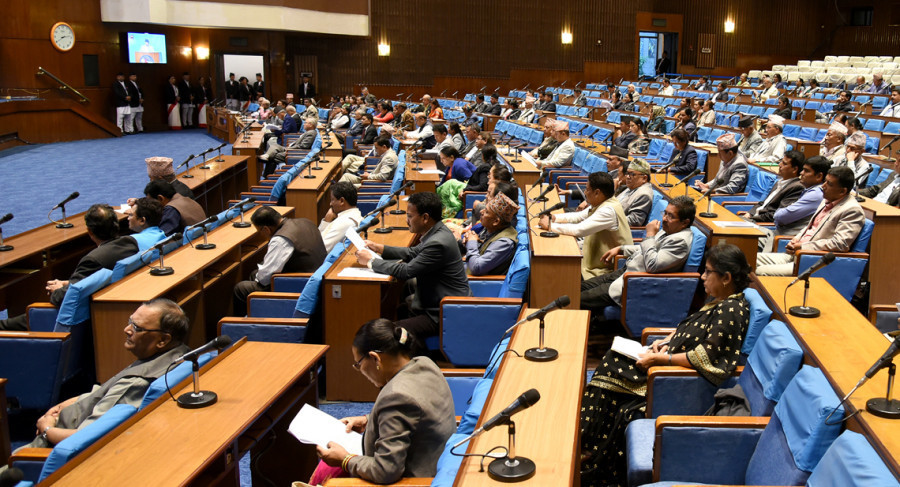National
Lawmakers across parties for continuing pork barrel funds
They say misuse of the funds in some places doesn’t mean the Local Infrastructure Development Partnership Programme has failed across the country.
Binod Ghimire
As the government is busy finalising the budget for the upcoming fiscal year, lawmakers across party lines are for the continuation of the controversial Local Infrastructure Development Partnership Programme in the new fiscal year.
The programme that allows directly-elected lawmakers to use millions of rupees in their constituencies in consultation with the respective local governments has been mired in controversy for its scattered allocations mainly to unproductive sectors.
A total of Rs 6.6 billion has been allocated under the programme in the current fiscal year with 165 electoral constituencies receiving Rs 40 million each. The government allocated the sum for the programme ignoring directives from the Parliament’s State Affairs and Good Governance Committee to redirect the money towards Covid-19 response and improvement of the health infrastructure, instead.
While allocating the budget, the government said the lawmakers would be using the budget to tackle the pandemic and on the health sector. However, Covid-19 response wasn’t in the priority of the lawmakers when they selected the projects.
“Most of the budget has gone towards road construction while there has been investment in the construction of temples as well,” Dilaram Panthi, the chief of the Local Level Coordination Section at the Ministry of Federal Affairs and the General Administration, told the Post. “Very limited money has gone towards Covid-19 response.”
However, the cross-party lawmakers say the programme should be continued because it has a significant contribution in development at the local level. They say the mismanagement of the budget in some places doesn’t mean the programme has failed across the country.
“We want a continuation of the programme in the upcoming fiscal year as well,” Sanjay Gautam, a Nepali Congress lawmaker from Bardiya, told the Post. “I can claim the programme has brought positive changes in most places.” He said his party’s lawmakers have requested the party leadership to ask the government to bring a focused budget for fiscal year 2021-22 while continuing the programme.
The government is busy preparing the new budget which needs to be presented in Parliament on May 29.
Just like last year the country is currently gripped by the coronavirus pandemic, which has exposed the country’s poor health system. There’s a view that the government shouldn’t continue the programme in the new budget and that money should be spent on the health sector.
“Our committee is against continuing the programme,” Shashi Shrestha, chairperson of the State Affairs Committee, told the Post. “The money, when scattered in different projects, doesn’t bring expected results. It should rather be used in developing health facilities or in providing relief to the affected population.”
Amid demands to concentrate the budget on high priority issues, the government in October last year revised the working procedure for the programme making it more distributed. The working procedure envisions implementing the programme only through the consumer committees. An earlier provision in the working procedure said that half of the programme’s budget should be spent on projects costing Rs 5 million or above, but the revised procedures state that the budget can be spent on as many as 30 projects which have an estimated cost of over 1 million each.
Lawmakers say they need the funds to fulfill their campaign trail promises to fund local development projects. Bishal Bhattarai, chief whip of the CPN-UML, said a group of lawmakers representing Province-1 has already requested the Finance Ministry to continue the programme.
“I too strongly want the programme to continue in the new fiscal year as well,” he told the Post. “I am lobbying personally and on behalf of my party to ensure that the new budget will have money for the lawmakers to execute development projects in their constituencies.”
The Constituency Infrastructure Special Programme and the Constituency Development Programme were merged and renamed Local Infrastructure Development Partnership Programme in an attempt to concentrate the budget to fewer projects. The modality for the use of the budget too was changed making it mandatory for the respective lawmakers to consult the respective local governments unlike in the past when they enjoyed exclusive prerogative. The change in the name and modality, however, hasn’t brought positive changes, according to experts.
There’s a view that the federal government and federal lawmakers shouldn’t be engaged in small projects when there are powerful local governments capable of executing such projects.
“The job of federal parliamentarians is to make laws and policies,” Shrestha said. “However, our lawmakers are focused on other things and are least interested in their actual jobs.” Economists say the programme is against federalism and should be discontinued. They said the programme is just being used by the lawmakers to show their influence in their constituencies. “I have been suggesting that the programme should be stopped and the funds redirected to bigger projects,” Shanta Raj Subedi, former finance secretary, told the Post. “At present the country needs investments in the health sector. The money meant for the programme should be spent for setting up hospital beds, ICUs and vaccination campaigns.”




 13.12°C Kathmandu
13.12°C Kathmandu














